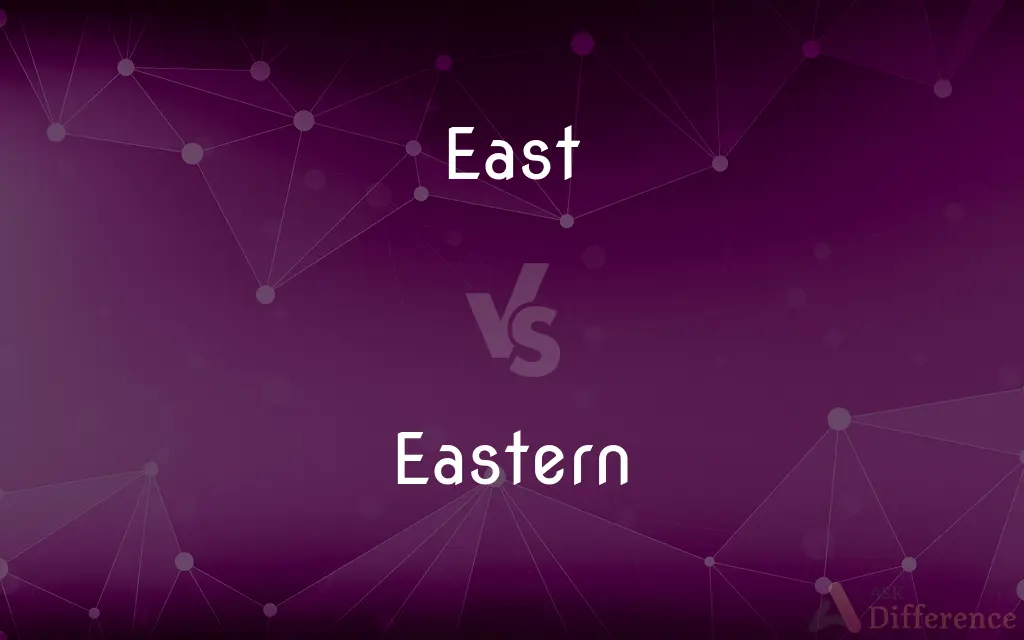East vs. Eastern — What's the Difference?
By Tayyaba Rehman & Maham Liaqat — Updated on March 29, 2024
"East" refers to a cardinal direction, indicating a specific geographical point, while "Eastern" describes a relative location or cultural region.

Difference Between East and Eastern
Table of Contents
ADVERTISEMENT
Key Differences
"East" is one of the four primary cardinal directions, used to navigate and describe geographical locations on Earth. In contrast, "Eastern" is an adjective that describes something as being from, located in, or related to the east of a particular point or region.
When discussing geography, "east" is often used to specify an absolute direction or location. For example, traveling east from a specific point. On the other hand, "Eastern" is used to describe relative positions or areas, such as the Eastern United States, denoting a part of a larger area that lies towards the east.
In cultural contexts, "Eastern" can denote characteristics, traditions, or influences from regions traditionally considered as the East, like Eastern philosophy. "East," however, is less commonly used in such discussions, as it more specifically denotes direction rather than cultural or regional attributes.
The use of "Eastern" can also imply a broader cultural or geopolitical understanding, referring to countries or regions like Eastern Europe or the Eastern world, which encompasses diverse cultures and nations. "East," by itself, lacks this nuance, serving more as a navigational term.
While "East" is straightforward in its application to direction and location, "Eastern" carries additional layers of meaning, often used to describe influence, origin, or characteristics, making it more versatile in descriptive language.
ADVERTISEMENT
Comparison Chart
Definition
Cardinal direction on a compass
Relating to or situated in the east
Usage
Geographical navigation
Descriptive, indicating relative location or cultural aspects
Context
Specific direction or point
Cultural, regional, or locational attributes
Examples
"Travel east for 10 miles."
"Eastern cuisine is diverse and rich."
Implication
Absolute direction
Relative position, cultural or regional identity
Compare with Definitions
East
A cardinal direction opposite of west.
The sun rises in the east.
Eastern
Relating to countries or regions in the eastern part of a continent.
Eastern Europe has a rich history distinct from the west.
East
Used in navigation to specify a direction.
To find the treasure, walk east from the old oak tree.
Eastern
Used to describe the eastern part of a city, country, or the world.
The eastern district is known for its vibrant arts scene.
East
Can denote a general geographical area.
The climate changes as you move east across the continent.
Eastern
Indicates a relative position or orientation.
The eastern wing of the castle holds the ancient archives.
East
In global terms, often refers to Asia.
Trade routes to the east opened up new goods.
Eastern
Pertaining to the direction or parts situated in the east.
Eastern Canada is known for its maritime culture.
East
Specific in its application to direction.
The river flows east towards the sea.
Eastern
Denoting cultural or historical aspects of the East.
Eastern philosophy often focuses on harmony and balance.
East
East is one of the four cardinal directions or points of the compass. It is the opposite direction from west.
Eastern
Situated in, toward, or facing the east.
East
The cardinal point on the mariner's compass 90° clockwise from due north and directly opposite west.
Eastern
Coming from the east
Eastern breezes.
East
The direction of the earth's axial rotation.
Eastern
Native to or growing in the east.
East
An area or region lying in the east.
Eastern
Often Eastern Of, relating to, or characteristic of eastern regions or the East.
East
The eastern part of the earth, especially eastern Asia.
Eastern
Of or relating to the Eastern Church.
East
The eastern part of a region or country.
Eastern
Of or relating to the Eastern Orthodox Church.
East
The region of the United States east of the Allegheny Mountains and north of the Mason-Dixon Line.
Eastern
Of, facing, situated in, or related to the east.
East
The former Communist bloc of countries in Asia and especially in Eastern Europe.
Eastern
(of a wind) Blowing from the east; easterly.
East
The end of a church at which the altar is located. Also called liturgical east.
Eastern
(loosely) Oriental.
East
To, toward, of, facing, or in the east
The east bank of the river.
Eastern
Situated or dwelling in the east; oriental; as, an eastern gate; Eastern countries.
Eastern churches first did Christ embrace.
East
Originating in or coming from the east
A cool east wind.
Eastern
Going toward the east, or in the direction of east; as, an eastern voyage.
East
In, from, or toward the east
A river flowing east.
Eastern
Lying toward or situated in the east;
The eastern end of the island
East
One of the four principal compass points, specifically 90°, conventionally directed to the right on maps; the direction of the rising sun at an equinox.
Portsmouth is to the east of Southampton.
We live in the east of the country.
Eastern
Of or characteristic of eastern regions of the United States;
The Eastern establishment
East
The eastern region or area; the inhabitants thereof.
Eastern
Lying in or toward the east;
The east side of NY
Eastern cities
East
(ecclesiastical) In a church: the direction of the altar and chancel; the direction faced by the priest when celebrating ad orientem.
Eastern
Relating to or characteristic of regions of eastern parts of the world;
The Eastern Hemisphere
Eastern Europe
The Eastern religions
East
Situated or lying in or towards the east; eastward.
Eastern
From the east; used especially of winds;
An east wind
The winds are easterly
East
(meteorology) Blowing (as wind) from the east.
East
Of or pertaining to the east; eastern.
East
From the East; oriental.
East
(ecclesiastical) Designating, or situated in, the liturgical east.
The east front of a cathedral
East
Towards the east; eastwards
East
The point in the heavens where the sun is seen to rise at the equinox, or the corresponding point on the earth; that one of the four cardinal points of the compass which is in a direction at right angles to that of north and south, and which is toward the right hand of one who faces the north; the point directly opposite to the west.
The east began kindle.
East
The eastern parts of the earth; the regions or countries which lie east of Europe; the orient. In this indefinite sense, the word is applied to Asia Minor, Syria, Chaldea, Persia, India, China, etc.; as, the riches of the East; the diamonds and pearls of the East; the kings of the East.
The gorgeous East, with richest hand,Showers on her kings barbaric pearl and gold.
East
Formerly, the part of the United States east of the Alleghany Mountains, esp. the Eastern, or New England, States; now, commonly, the whole region east of the Mississippi River, esp. that which is north of Maryland and the Ohio River; - usually with the definite article; as, the commerce of the East is not independent of the agriculture of the West.
East
Toward the rising sun; or toward the point where the sun rises when in the equinoctial; as, the east gate; the east border; the east side; the east wind is a wind that blows from the east.
East
Designating, or situated in, that part of a church which contains the choir or chancel; as, the east front of a cathedral.
East
Eastward.
East
To move toward the east; to veer from the north or south toward the east; to orientate.
East
The cardinal compass point that is at 90 degrees
East
The countries of Asia
East
The region of the United States lying north of the Ohio River and east of the Mississippi River
East
Situated in or facing or moving toward the east
East
To, toward, or in the east;
We travelled east for several miles
Common Curiosities
What is the main difference between "East" and "Eastern"?
"East" is a cardinal direction, while "Eastern" is an adjective describing something related to or located in the east.
Is "East" only used in a geographical sense?
Primarily, yes. "East" is used to indicate direction or location on Earth, though it can metaphorically represent origins or cultural directions.
How do "Eastern" traditions differ from "Western" ones?
"Eastern" traditions, originating from Asia, the Middle East, and other eastern regions, often emphasize community, spirituality, and harmony with nature, contrasting with the individualism and material focus sometimes associated with "Western" traditions.
Can "East" and "Eastern" be used interchangeably?
No, because "East" specifies a cardinal direction, while "Eastern" describes something related to, characteristic of, or situated in the east.
Can "Eastern" be used without specifying a point of reference?
While "Eastern" usually refers to a relative location, it can be used without a specific reference point in contexts where the general eastern region or cultural aspect is understood.
Why is "Eastern" used to describe cultural regions or attributes?
"Eastern" encompasses not only geographical location but also the rich and diverse cultural, historical, and philosophical traditions of regions considered part of the East.
Are there specific countries considered part of the "Eastern" world?
Yes, countries in Asia, the Middle East, and Eastern Europe are often categorized as part of the "Eastern" world, though the exact definitions can vary based on context.
How do geography and climate influence the concept of "Eastern"?
Geographic and climatic factors contribute to the distinct environmental, social, and economic characteristics that define "Eastern" regions.
What role does the idea of "Eastern" play in art and literature?
"Eastern" influences in art and literature often reflect themes, aesthetics, and philosophies distinct to eastern cultures, adding depth and diversity to creative works.
How does the concept of "East" influence global politics?
The concept of "East," especially as differentiated from the West, can influence global politics through the framing of cultural, economic, and strategic partnerships or rivalries.
How do directions like "East" impact cultural identity?
Directions can significantly impact cultural identity by shaping regional narratives, cultural exchanges, and historical distinctions between the East and other parts of the world.
Is the division between East and West still relevant today?
While globalization has blurred many distinctions, the conceptual division between East and West remains relevant in cultural, philosophical, and geopolitical discussions.
How do "East" and "Eastern" contribute to understanding world history?
These concepts help in categorizing historical events, cultural movements, and geopolitical shifts, offering insights into the interconnectedness and diversity of human societies.
Can "Eastern" refer to a specific style or genre in music and film?
Yes, "Eastern" can describe styles or genres that incorporate traditional or contemporary elements from eastern cultures.
Does the use of "Eastern" reinforce stereotypes?
It can, if used without consideration for the diversity and complexity within eastern cultures. Thoughtful use is important to avoid oversimplification.
Share Your Discovery

Previous Comparison
Science vs. Pseudoscience
Next Comparison
Duplicate vs. OriginalAuthor Spotlight
Written by
Tayyaba RehmanTayyaba Rehman is a distinguished writer, currently serving as a primary contributor to askdifference.com. As a researcher in semantics and etymology, Tayyaba's passion for the complexity of languages and their distinctions has found a perfect home on the platform. Tayyaba delves into the intricacies of language, distinguishing between commonly confused words and phrases, thereby providing clarity for readers worldwide.
Co-written by
Maham Liaqat















































